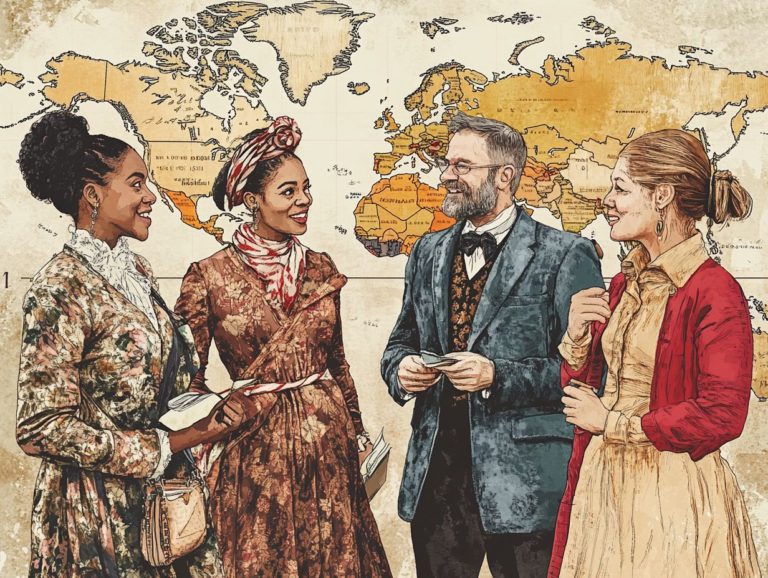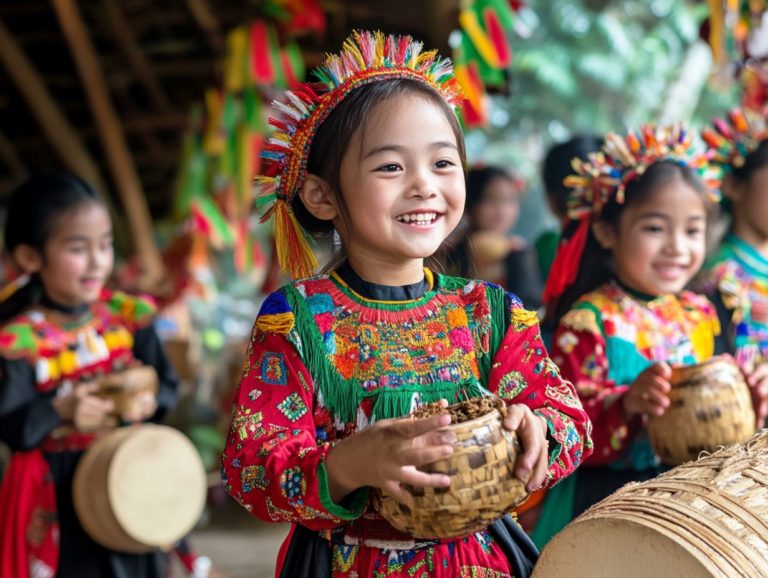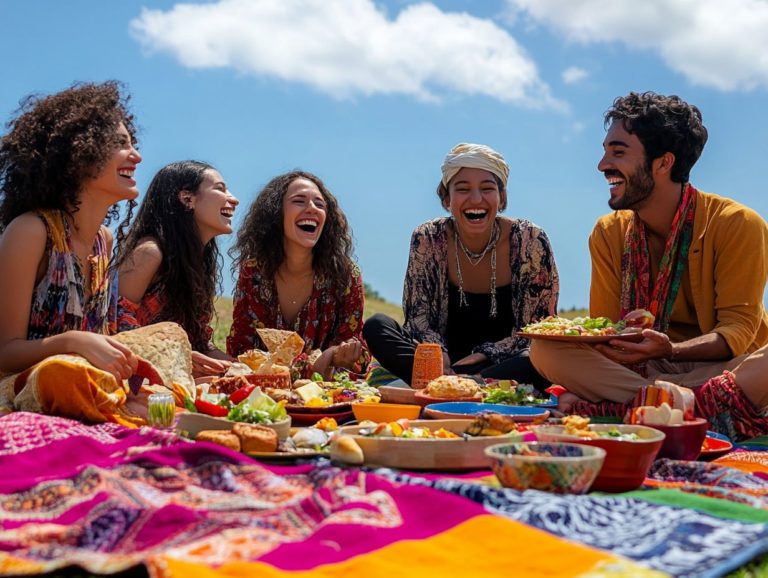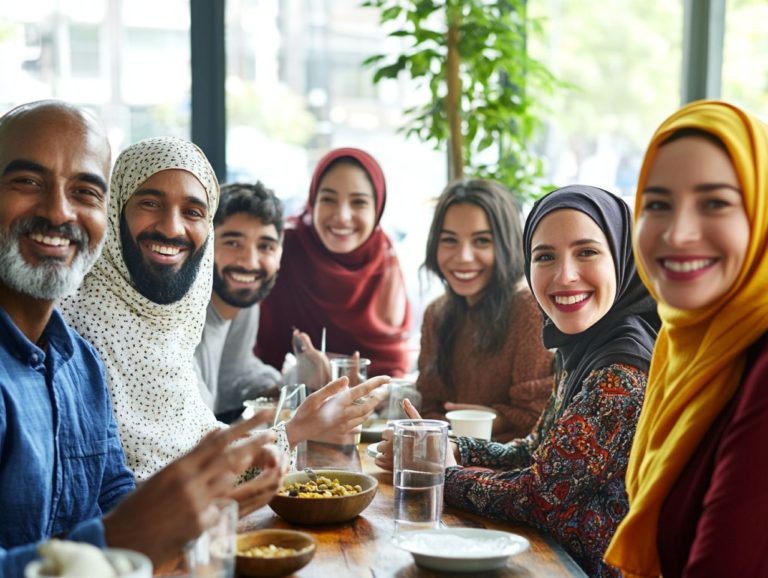How to Approach Cultural Differences with Respect
In today s interconnected world, grasping and honoring diverse cultures is not just important; it s vital for our future.
This article reveals why cultural respect matters, showcasing the vibrant tapestry of traditions and customs that enrich our global society. It tackles common misconceptions and stereotypes that can obstruct authentic connections and provides practical strategies for enhancing communication.
Discover how to navigate conflicts with respect and embrace the invaluable lessons that diversity offers, paving the way for your personal growth and more meaningful relationships. Embark on this enlightening journey toward greater cultural understanding.
Contents
- Key Takeaways:
- The Importance of Cultural Respect
- Challenges in Approaching Cultural Differences
- Practicing Cultural Respect
- Addressing Conflicts and Misunderstandings
- Continuing to Learn and Grow
- Frequently Asked Questions
- What does it mean to approach cultural differences with respect?
- Why is it important to approach cultural differences with respect?
- How can I approach cultural differences with respect?
- What are some potential challenges when approaching cultural differences with respect?
- How can I handle misunderstandings or conflicts related to cultural differences with respect?
- What are some benefits of approaching cultural differences with respect?
Key Takeaways:
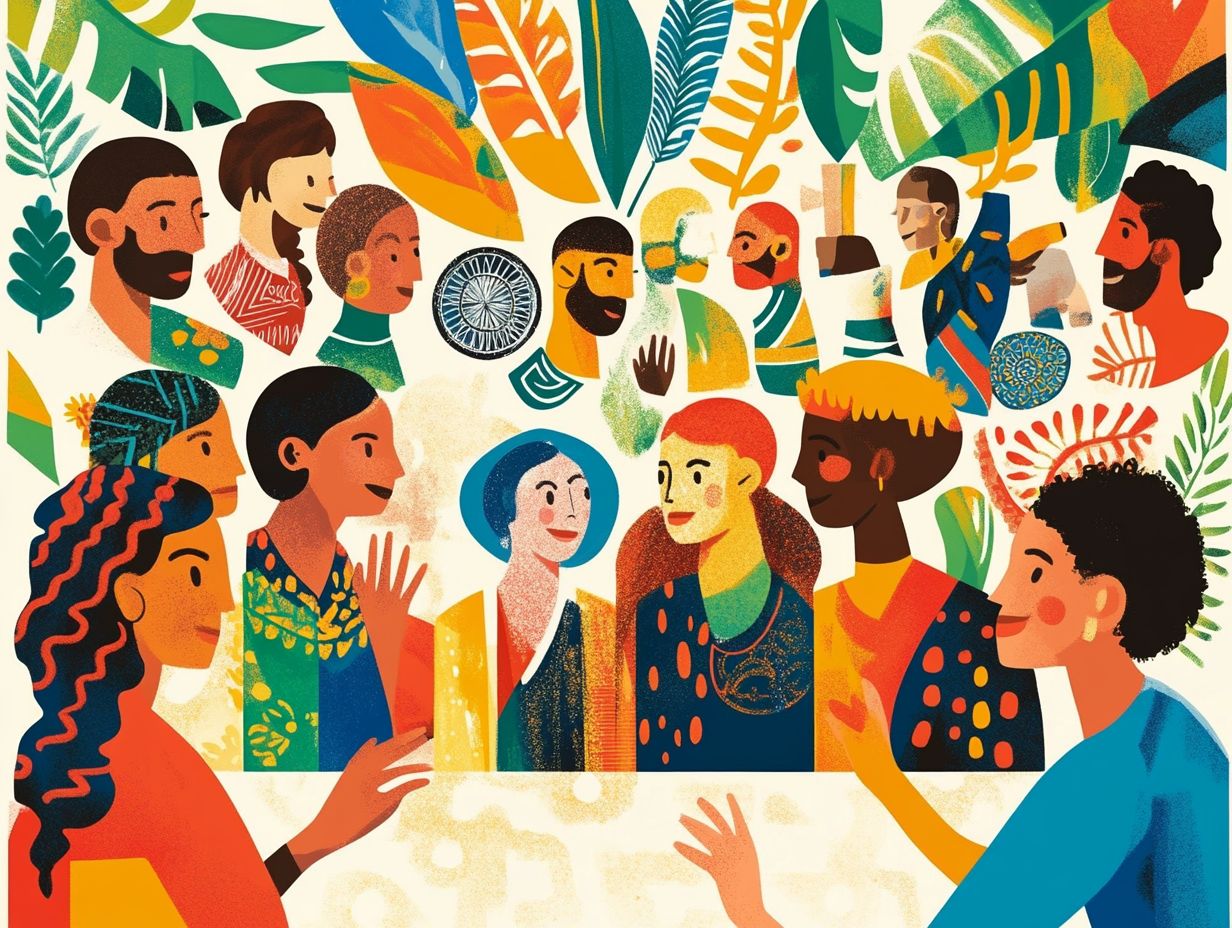
Here are some key takeaways to remember:
- Understanding and respecting different cultures is crucial in promoting harmony and diversity in society.
- Challenges in approaching cultural differences include common misconceptions and stereotypes, which can be overcome through open-mindedness and empathy.
- Practicing cultural respect involves effective communication and actively respecting customs and traditions.
The Importance of Cultural Respect
Cultural respect is essential in today s global society, where diverse cultures coexist and interact. Each culture boasts its own traditions, customs, and political contexts. By cultivating an understanding of these differences, you can truly appreciate the traditions and customs passed down through generations and enhance your relationships with others, nurturing a community where mutual respect flourishes.
When you engage with individuals from various backgrounds, you open yourself to a wealth of knowledge and experiences that can enrich your life and broaden your perspectives on human interaction.
Understanding Different Cultures
To truly grasp the nuances of different cultures, immerse yourself in them. Engage with others and observe their traditions, rituals, and social interactions that reflect their cultural norms and community aspirations.
This engagement becomes even more meaningful when you actively listen to their stories. These often unveil profound insights and personal experiences uniquely tied to their backgrounds. By showing genuine curiosity about various customs and practices, you not only foster deeper connections but also demonstrate respect for their way of life.
Asking thoughtful questions and participating in community events allows you to appreciate the values that shape diverse identities on a more profound level. These interactions open the door to enriching dialogues that celebrate the beauty of human differences while reinforcing shared experiences.
In doing so, you contribute to a more inclusive environment where everyone feels valued and understood.
Challenges in Approaching Cultural Differences
Navigating cultural differences can pose various challenges, from misunderstandings and stereotypes to a noticeable lack of cultural sensitivity and responsiveness. These obstacles can hinder meaningful engagement among individuals from various backgrounds.
Common Misconceptions and Stereotypes
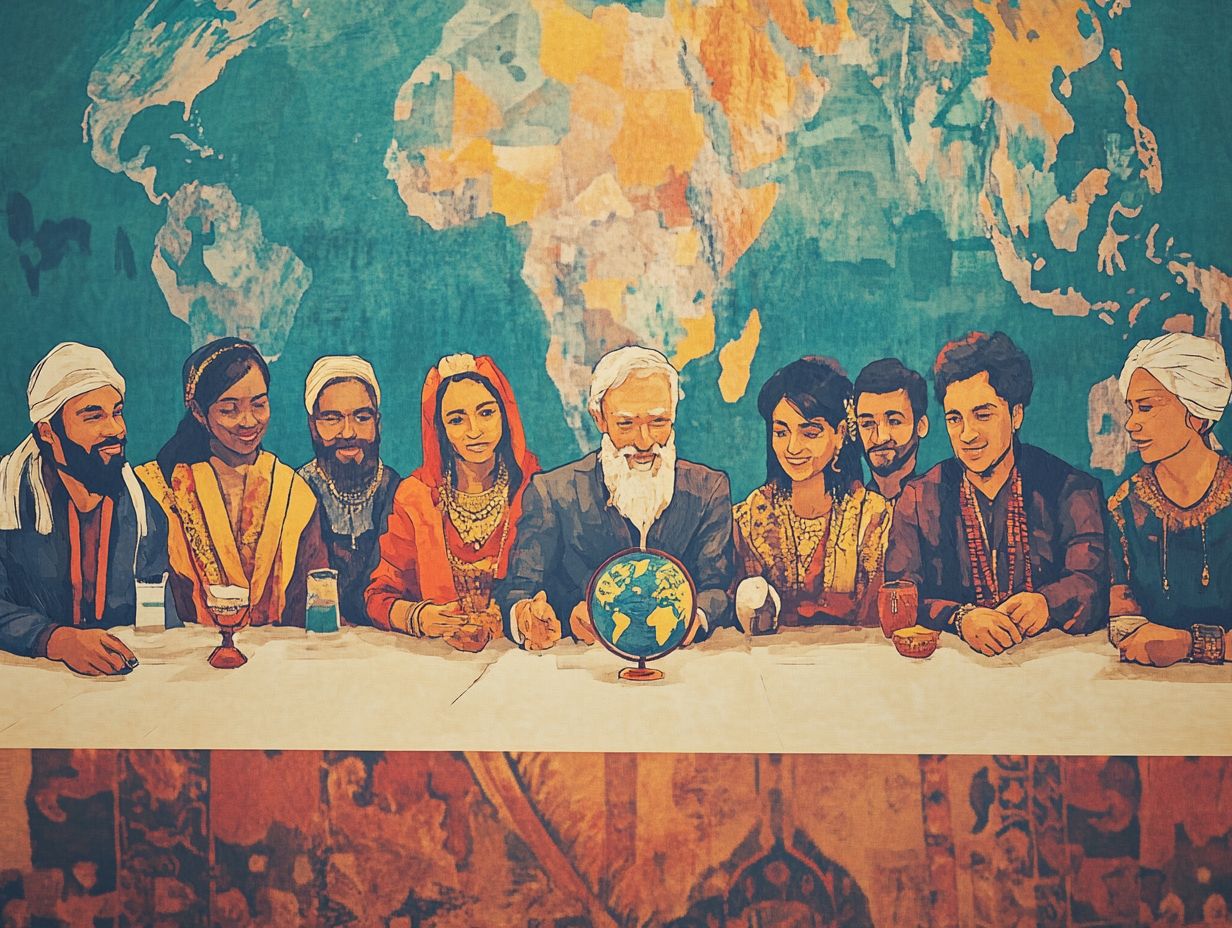
Common misconceptions and stereotypes often arise from a lack of understanding, significantly affecting how you perceive cultural identity and hindering your ability to fully embrace diversity.
These misguided notions simplify intricate cultures into narrow narratives, paving the way for ignorance and intolerance. For instance, believing that all members of a particular culture share the same beliefs or behaviors overlooks the unique perspectives within that group, fostering division instead of unity.
When you assume that a single story defines a culture, you miss out on the richness and complexity that varies from person to person. Engaging in educational initiatives and open dialogues can help dismantle these stereotypes, encouraging you to explore and appreciate the cultural nuances that enhance our global community.
Practicing Cultural Respect
Practicing cultural respect is crucial for cultivating meaningful interactions and nurturing harmonious relationships in our richly diverse global society. This involves being acutely aware of cultural sensitivities and adhering to proper travel etiquette when engaging with others.
Understanding these misconceptions is the first step in practicing cultural respect. Start your journey today by reaching out to someone from a different culture!
Communication and Listening Skills
Effective communication and listening skills are essential for understanding and respecting different cultures. They enable you to appreciate the nuances of various communication styles while engaging respectfully with diverse communities.
In today s interconnected world, mastering these skills can transform your interactions and deepen your relationships. You can enhance your listening abilities by actively focusing on the speaker, asking clarifying questions, and remaining open to perspectives that differ from your own.
Recognizing the significance of non-verbal communication ways we communicate without words, like gestures or facial expressions can profoundly convey your respect and genuine interest. These strategies bridge cultural gaps and foster trust, allowing for more effective exchanges and the development of mutual understanding.
Respecting Customs and Traditions
Respecting customs and traditions is essential for your cultural awareness, as it underscores the importance of local practices, culinary delights, and family rituals in shaping cultural heritage.
These traditions act as a bridge linking generations, revealing the distinctiveness of each culture while fostering a sense of belonging. By immersing yourself in diverse customs whether through festival celebrations or culinary rituals you enrich your personal experiences and cultivate mutual respect among various communities.
When you honor these customs, you gain insight into others ways of life and play a role in preserving cultural identities that have endured through time. Embracing these traditions encourages meaningful interactions, paving the way for stronger relationships while celebrating the vibrant tapestry of humanity.
Addressing Conflicts and Misunderstandings

Addressing conflicts and misunderstandings stemming from cultural differences demands a solid foundation of cultural respect and awareness. This approach enables you to navigate and resolve differences effectively while preserving positive relationships.
Resolving Differences with Respect
Resolving differences with respect is crucial for promoting cultural sensitivity and fostering appreciation for the diverse perspectives that enhance social interactions and community cohesion.
This approach encourages you to actively listen to others, striving to understand the various cultural backgrounds that shape their viewpoints. By creating an environment where open dialogue is encouraged, you cultivate a sense of trust and mutual understanding. You must recognize that everyone brings unique experiences to the conversation, and these varied perspectives can significantly enrich discussions.
Emphasizing empathy allows you to step into someone else’s shoes, facilitating deeper connections and the potential for finding common ground. These strategies bridge divides and elevate collective experiences within diverse communities.
Continuing to Learn and Grow
Continuing to learn and expand your understanding of cultural differences is essential as you engage with and explore diverse cultures. This journey enriches your life and enhances cultural education through your personal experiences.
Embracing Diversity and Cultural Understanding
Embracing diversity and fostering cultural understanding are vital for achieving community goals and creating a cohesive global society that respects and appreciates the myriad personal beliefs and backgrounds that exist.
By recognizing and valuing the unique perspectives that individuals from different cultures bring, you can ignite innovation and expand your horizons. For example, participating in initiatives like multicultural festivals or community potlucks allows you to celebrate various traditions and helps you build relationships across cultural lines. Programs that incorporate diverse voices in local decision-making produce more effective solutions, accurately reflecting the needs of the community as a whole.
Engaging in local events that showcase this rich tapestry encourages you to appreciate and learn from one another, ultimately paving the way for a more harmonious coexistence.
Frequently Asked Questions

What does it mean to approach cultural differences with respect?
Approaching cultural differences with respect means recognizing and appreciating the differences between cultures. To effectively navigate these variations, it’s important to understand how to prepare for cultural differences. Be mindful of how these differences affect interactions and relationships.
Why is it important to approach cultural differences with respect?
Approaching cultural differences with respect is important because it promotes understanding, acceptance, and inclusivity among individuals from different cultures, helping you learn how to use cultural differences to enhance learning.
It also helps to avoid misunderstandings and conflicts that may arise from cultural differences.
How can I approach cultural differences with respect?
You can approach cultural differences with respect by being open-minded and listening actively. For more insights, check out this guide on how to navigate cultural differences in your internship. Avoid assumptions or stereotypes.
Educating yourself about different cultures and their customs, values, and beliefs is also helpful.
What are some potential challenges when approaching cultural differences with respect?
Some potential challenges include language barriers and differing communication styles. Conflicting cultural norms and values can also pose difficulties.
Building trust can be challenging but is essential for rich connections!
If a misunderstanding or conflict arises, approach the situation calmly and with respect. Listen to the other person’s perspective.
Try to find a resolution that considers both cultural backgrounds. It may also help to seek guidance from a mediator (someone who helps resolve disputes) or a cultural expert.
What are some benefits of approaching cultural differences with respect?
Approaching cultural differences with respect can lead to increased diversity and inclusivity in communities and organizations, making it important to understand cultural differences when traveling.
It promotes personal growth and learning, as well as the opportunity to form meaningful connections with people from diverse cultures.

